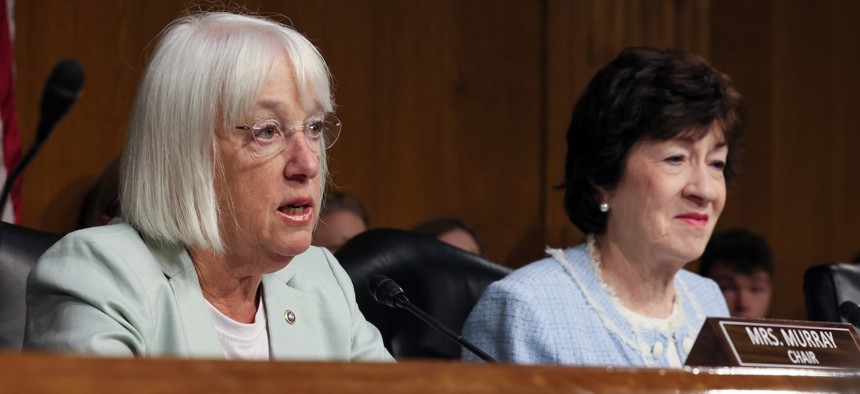
Sens. Patty Murray, D-Wash., and Susan Collins, R-Maine, before a Senate Appropriations Committee hearing on July 11, 2023. Jemal Countess/Getty Images for JDRF
'This is the law, allocate the funding': Trump's funding freeze faces bipartisan and renewed court opposition
Top appropriators in the Senate are accusing Trump of unlawfully withholding $3 billion from the just-signed FY25 spending bill.
A bipartisan pair of senators who oversee the federal spending process are imploring the Trump administration to spend the money Congress has allocated, suggesting the president has flouted historical interpretation of funding laws.
The Trump administration is declining to spend $3 billion Congress recently provided as part of the funding measure that will keep agencies afloat through September, saying that money was “improperly designated” as emergency funds. That decision violates federal law and the longstanding implementation of it, Sens. Susan Collins, R-Maine, and Patty Murray, D-Wash., the chair and ranking member of the Senate Appropriations Committee, said in a letter on Thursday to Office of Management and Budget Director Russ Vought.
The concern stemmed from a provision of the 2023 Fiscal Responsibility Act, which set funding caps for fiscal years 2024 and 2025 while also including “emergency” funding outside those limits.
The recent continuing resolution Trump signed into law contained $12.8 billion in such emergency funding, as allowed for in the FRA, though Trump has informed Congress he will not spend $3 billion of that total. Trump has nixed funding largely focused on foreign aid and humanitarian assistance, with some of the total focusing on the State Department's efforts to combat fentanyl and human trafficking, foreign military financing and investments to secure U.S. supply chains.
Collins and Murray conceded presidents have some leeway in spending emergency funding attached to spending bills, but must choose to obligate either all or none of that money.
“Just as the president does not have a line-item veto, he does not have the ability to pick and choose which emergency spending to designate,” the senators said. “Regardless of our views on the Fiscal Responsibility Act and accompanying implementation agreement, it is incumbent on all of us to follow the law as written—not as we would like it to be.”
At a press conference on Thursday, Murray reiterated that she and Collins were informing the president that he does not have flexibility in determining which congressional funding to spend.
“We are telling him, ‘This is the law, allocate the funding,’” Murray said.
The bipartisan pushback comes as the administration is also facing pressure from federal courts to spend the money that Congress has allocated. The U.S. Court of Appeals for the First Circuit on Wednesday unanimously declined to grant the Trump administration’s request to block a lower court’s ruling that said the president could not unilaterally stop the flow of federal dollars. The original ruling concerned a memorandum OMB issued in January that placed a widespread freeze on federal grants and assistance, which the court found unlawful. OMB subsequently withdrew the memo, but the judge ruled its effects—and those of other executive actions to block congressionally authorized funding—were still being felt.
While the administration argued its funding pauses were targeted and only aimed at certain spending not mandated in law and out of line with Trump’s agenda, the appeals court said the freezes were instead “categorical in nature.” The court added that the administration asserted its actions were lawful but did not make any effort to defend them as such.
The 1974 iImpoundment Control Act prohibits the executive branch from withholding congressionally appropriated funds for policy reasons. It does allow for a narrow set of circumstances when the president can freeze funding, including for unforeseen circumstances, as provided in law or from savings realized by operational efficiencies. In those cases, however, the White House must notify Congress of its deferrals and specify a timeframe for releasing them.
Trump and Vought have repeatedly called that law unconstitutional and have vowed to fight it in court. While the administration argued the impoundment law did not apply in the funding freeze case, it could appeal the court’s decision to the Supreme Court in an effort to create new precedent that gives the president more flexibility in withholding appropriations.
How are these changes affecting you? Share your experience with us:
Eric Katz: ekatz@govexec.com, Signal: erickatz.28
Sean Michael Newhouse: snewhouse@govexec.com, Signal: seanthenewsboy.45
Erich Wagner: ewagner@govexec.com; Signal: ewagner.47
NEXT STORY: Dems call for Bisignano to withdraw as SSA tweaks controversial plan







